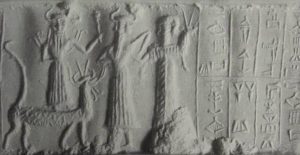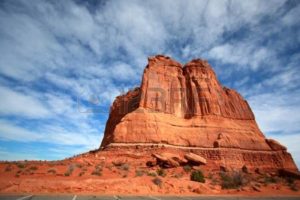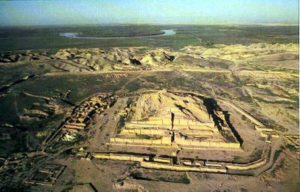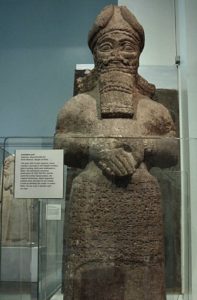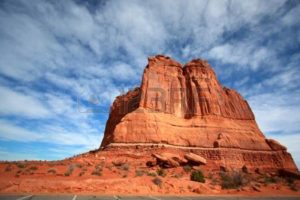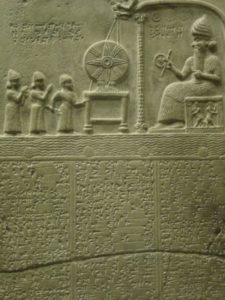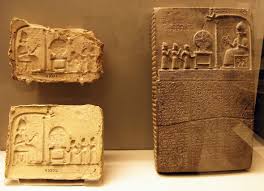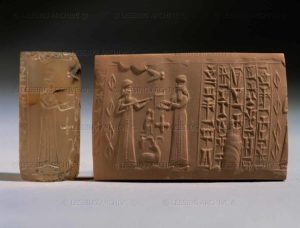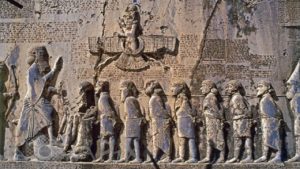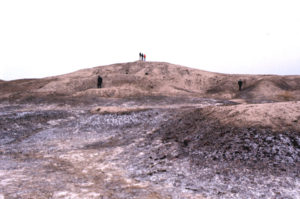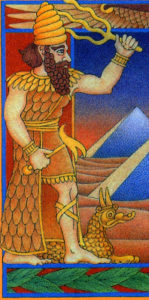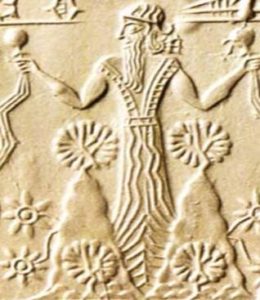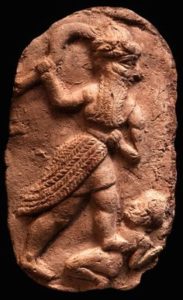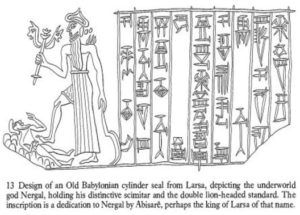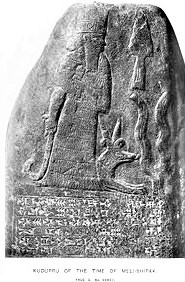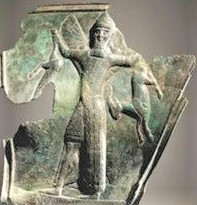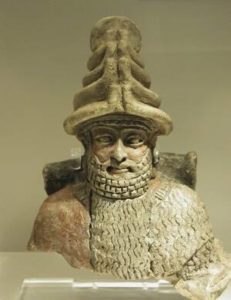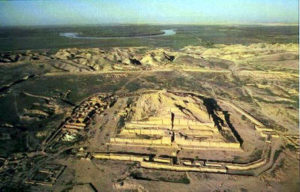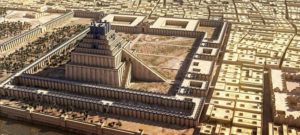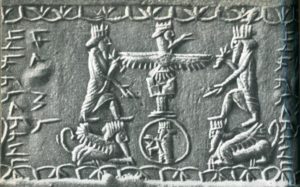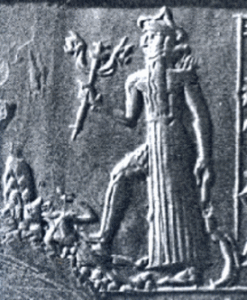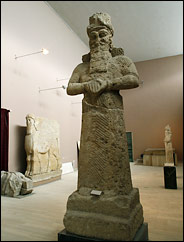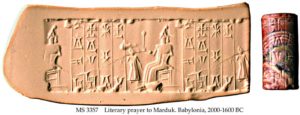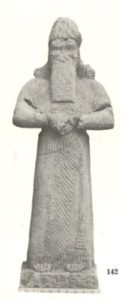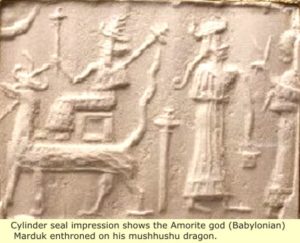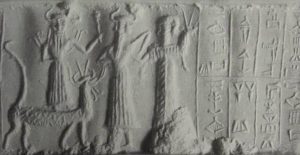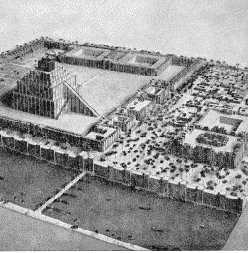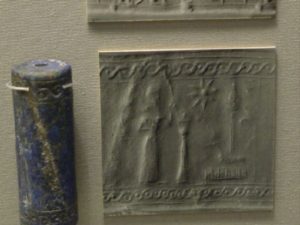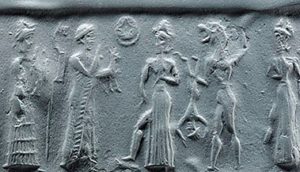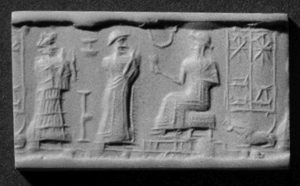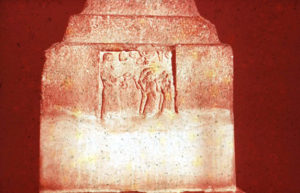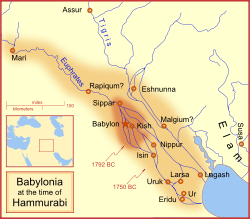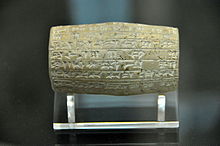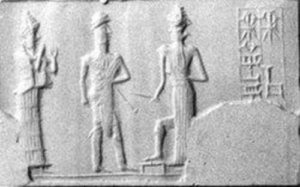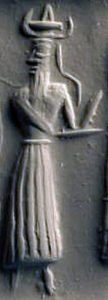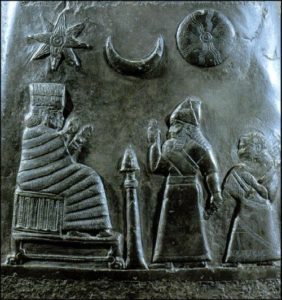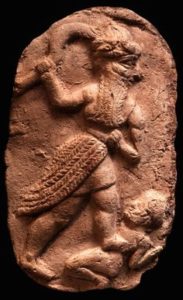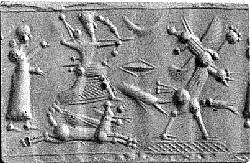http://oracc.museum.upenn.edu
(Texts: All Artifacts, Color Coding, & Writings in Bold Type With Italics Inside Parenthesis, are Added by Editor R. Brown, not the Authors, Translators, or Publishers!)
(gods in blue … mixed-breed demigods in teal)
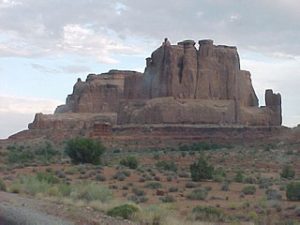
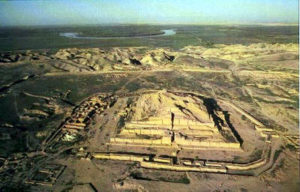 (Nabu’s Ezida; Marduk’s Esagil residences)
(Nabu’s Ezida; Marduk’s Esagil residences)
Neriglissar, king of Babylon, the one who renovates Esagil and Ezida, the one who performs good deeds,
about whom the great gods made a decision for exercising his everlasting kingship, whose fate the god Marduk —
the foremost of the gods, the one who decrees fates — determined to exercise authority over the lands,
in whose hands the god Nabû — the legitimate heir (of father Marduk) —
let grasp a just scepter to perform the rôle of shepherd of the black-headed (people),
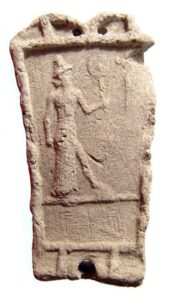 (Nergal, Lord of the Under World)
(Nergal, Lord of the Under World)
to whom the god Erra (Nergal) — the majestic one of the gods —
gave his weapon(s) to save the people (and) spare the land, son of Bēl-šum-iškun — king of Babylon — I.
When the god Marduk, great lord, elevated me (and) gave me the land and people to rule,
I myself was constantly present (and) incessant towards Marduk.
I provide for Esagil and Ezida, keep shrines in good order, (and) constantly seek original rites.
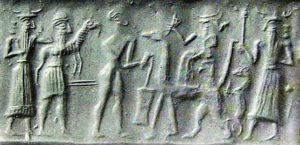 (Marduk on his throne riding his dragon Mushhushu)
(Marduk on his throne riding his dragon Mushhushu)
(As for) the copper mušḫuššu-dragon(s), which are always stationed at the bases of the gates of Esagil
together with the silver wild bull(s) of the door-jambs, a former king did not station (them)
in (the gates) Ka-Utu-e, Ka-Lamma-arabi, Ka-ḫegal, and Ka-ude-babbar.
As for me, the humble (and) respectful one who knows how to revere the gods,
I cast eight fierce mušḫuššu-dragons of copper that rain down deadly venom on evil doer(s) and enem(ies),
covered (them) with a plating of shining silver, and stationed (them) on pedestal(s)
in (the gates) Ka-Utu-e, Ka-Lamma-arabi, Ka-ḫegal, and Ka-ude-<babbar>,
at the bases of those gates, as in the past, together with the silver wild bull(s)
of the door-jambs, according to its original appearance.
(As for) the Dais of Destinies, which is inside Ezida, on which the god Nabû —
the [triumphant] heir — takes up residence at the New Year, at the beginning of the year,
during the akītu-festival, (during) the setting out of the Enlil of the gods —
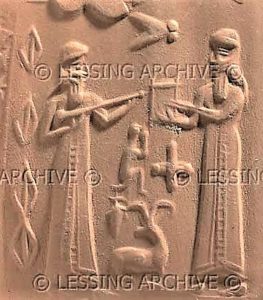 (son & scribe Nabu before father Marduk)
(son & scribe Nabu before father Marduk)
the god Marduk — the god Nabû — the legitimate heir — goes in procession into Šuanna (Babylon),
on the fifth (and) eleventh days, when going and returning from Babylon,
whose structure a former king had cast with silver,
I covered it with shining gold (and) ornaments of brilliance.
(As for) the Euphrates River, the river of abundance,
whose waters since its creation have flowed in full spate directly beside Esagil,
(but) whose waters had withdrawn from the side of Esagil
(and) had become too distant to draw (water from it) during the reign of a former king,
(but as for) me, I sought out its original location and directed the course of its water beside Esagil, as in the past.
(As for) the eastern canal, which a former king had had dug, but had not constructed its bank,
I had the canal (re)dug and (properly re)constructed its bank with bitumen and baked bricks.
I firmly established for the land an abundance of water that does not cease.
I am constantly incessant towards Esagil and Ezida,
(and) constantly seek to provision all of the cult-centers of the gods.
At that time, the palace, the residence of my royal majesty, which is in the Ka-dingirra district —
which is in Babylon, from Ay-ibūr-šabû, the street of Babylon, to the bank of the Euphrates River —
which a former king had built and whose door-jamb(s) he had installed inside (it):
On the outside, the palatial hall over the bank of the Euphrates River collapsed and its brickwork had fallen apart.
I removed its collapsed walls until I reached the level of the water.
With bitumen and baked bricks, I firmly secured its base against water,
and (then) built (it), completed (it), and raised its superstructure.
I spread out strong cedar(s) to be its šīpu(s), architrave(s), and roof.
O Marduk, the great lord, the Enlil of the gods, the resplendent one, the light of the gods — his fathers —
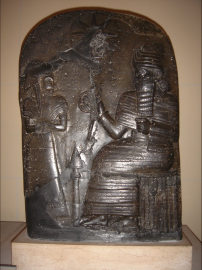 (Marduk gives exalted commands to his mixed-breed king)
(Marduk gives exalted commands to his mixed-breed king)
by your exalted command, which cannot be altered, may I be sated with the charms of the palace that I built;
may I reach extreme old age (and) attain very old age (of a semi-divine mixed-breed) inside it;
may I receive inside it, from the horizon to the zenith, wherever the sun rises,
substantial tribute from the kings of the regions of the entire inhabited world;
(and) inside it may my descendants rule over the black-headed (people) forever.
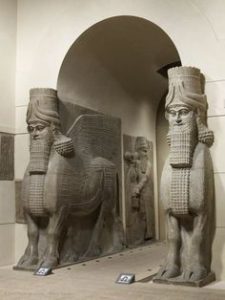 (palace entrance for King Sargon II)
(palace entrance for King Sargon II) 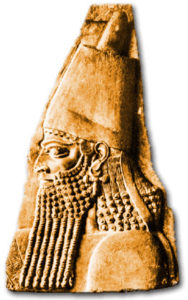
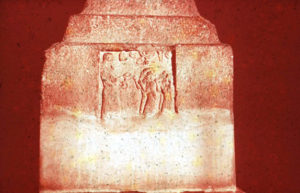 (giant god Marduk & mixed-breed king, etc.)
(giant god Marduk & mixed-breed king, etc.)

